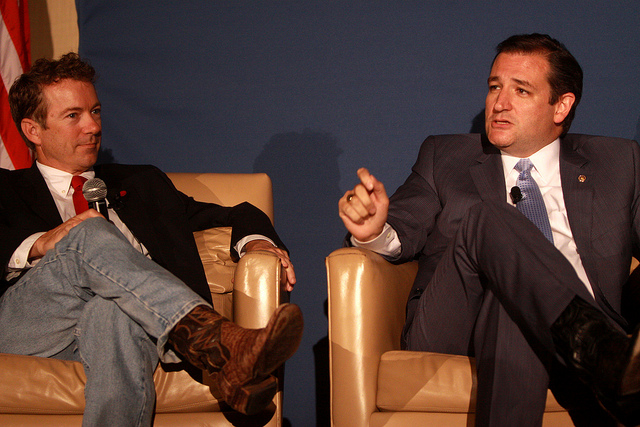Gay marriage will finally have its day before the highest court in the nation. The U.S. Supreme Court will hear four states’ cases Tuesday which could determine if same-sex marriage is a U.S. constitutional right… or not. Same sex marriage is already allowed in 36 states, Texas not included. Politically speaking, this is seen by most folks as an issue that breaks along party lines. Democrats support gay marriage. In what is shaping up to be a crowded GOP primary this election cycle, Republicans aren’t sticking to their traditional “against” role in the debate.
David Crary, a reporter for the Associated Press says Republicans are walking a finer line than the simple “yay” and “nay” stance. Crary says same-sex marriage is a tricky balancing act for the candidates. Not only must they cater to a short term audience, like the Iowa caucuses and states like South Carolina in the primaries, but they have to think long-term as well.
“[Short term] contests are heavily influenced by Christian evangelicals who pretty uniformly oppose gay marriage. So that’s one audience,” he says. “Down the road, whoever wins the nomination is gonna need votes from a much bigger scope of voters and is gonna have to be looking at moderates and independents who perhaps support gay marriage.”
The trick? It’s all in the language. Senator Ted Cruz of Texas and former governor of Arkansas Mike Huckabee have been using forceful language against same-sex marriage, which could help them come nomination time, but maybe not come election time. Crary told the Texas Standard other candidates have a different approach.
“I think Senator Cruz has made the decision to go for broke: try to win as many of the conservative votes short-term. Frankly, I’m not sure what his strategy would be to try and win moderates and independents come November,” Crary says. “Then you have people like Jeb Bush… who — while they say they still believe in one-man, one-woman marriage — couple those assertions with some softer language. Language trying to show respect for gay people; talking about whether they might attend a gay wedding, how they would react to having a gay child.”
One of the more interesting approaches comes from Rand Paul. He’s positioning himself as the most Libertarian in the field, but on the other hand hasn’t completely signed on in support for gay marriage.
“It’s a language that I think would have been too bold for Republicans five or 10 years ago, when people were talking about civil unions, as opposed to gay marriage. But I think that a lot of people looking at that language of Senator Paul would say that it’s a little past due date in that so much of the country has moved on — not as separate but equal contracts — but to whether or not there should be full-fledged marriage.”
One of the big questions is whether same-sex marriage will continue to be a top GOP candidate determining issue after the Supreme Court decision Tuesday.
“I think if the Supreme Court rules that there is indeed a nationwide constitutional right to marriage it will recede. It will diminish in importance and I think some of those Republican candidates we talked about would be delighted to not have to have it be a front burner issue” Crary says. “There certainly will be some kind of backlash from conservatives. We’ve all been hearing about these so-called religious freedom laws, that debate will continue but it’s possible the gay marriage issue will recede.”














